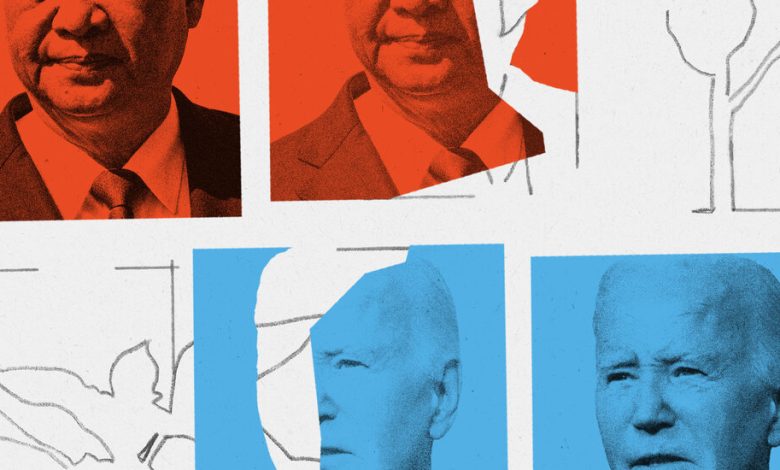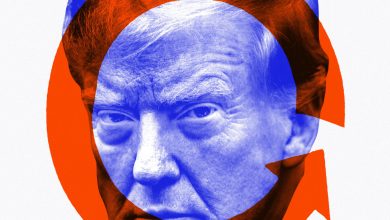A Message for the Aging Men Steering U.S.-China Relations

A couple of weeks ago, a young crowd in Shanghai came out in force to celebrate Halloween. The street where I live filled with revelers dressed in a range of elaborate costumes — as the white-clad enforcers of China’s Covid lockdowns, as Chinese courtesans or, simply, as a watermelon. Halloween allows us to dress up as something that we can’t otherwise be. It’s a strong impulse right now in China, which remains stuck in a post-pandemic malaise marked by job shortages, a trend of disillusioned 20-somethings dropping out of the work force and society and a general yearning for a different way to be.
These young people in China are much like their American counterparts. Many feel they are living in a world that worked well for their parents but isn’t working as well for them. Young people in America view China as less of a threat to the United States than their parents do and worry more about things that affect all of us. This includes climate change, which cannot be adequately addressed without cooperation between China and the United States, the two largest emitters of greenhouse gases.
Yet, as the aging leaders of China and the United States meet on Wednesday in San Francisco, there is the usual talk of unavoidable rivalry, intractable disputes on trade, technology and Taiwan and low expectations for the meeting. It is as if conflict between the two countries is something preordained, like an asteroid moving across a fixed path in the sky. But neither the United States nor China is a static entity; both are rapidly changing.
America and its hawkish politicians must stop viewing China’s Communist-led system as some immutable, monolithic foe to be vanquished; intergenerational transformation in China is well underway. When I first moved to China in 2008 at age 21, most Americans still harbored clichéd images of China, of a faraway land where the masses clogged streets on their bicycles or toiled away manufacturing the world’s goods. Some of those old tropes are rooted in reality. China’s older generations were, in fact, “builder” generations like the Americans of the 1950s, laying down rules, roads and lines on the map en route to turning China into the world’s factory. By China’s own admission, it is still modernizing.
But the sons and daughters of those builders are growing up in a very different world from their parents. They inherited the basic structure — of a nation that is rising once again, ready to make its mark on the world — but they will inevitably want to fill in how it looks and feels, and will challenge older mores in the process. There is widespread and growing discussion, for instance, of how to make Chinese society more equitable, green, urban and scientific. China is undergoing a profound transition to a high-tech, highly educated, prosperous and powerful nation that its “builder generation” could only imagine.
Live in China for a while and you realize that it’s not collapsing any time soon, despite what hawks in the United States might hope. Despite China’s unsteady transition away from low-cost labor and manufacturing toward innovation and consumption, its economy is still growing, albeit more slowly than in the past. Even as China builds coal plants, it has become a global renewables superpower, an exporter of electric vehicles, solar panels and wind turbines. Its tendency to be friendly with governments with which America is not, such as Russia, Iran and North Korea, means that American diplomats increasingly ask Beijing to use its leverage, including in the current Middle East turmoil. And in frontier technologies like artificial intelligence, experts agree that a discussion without China amounts to the West talking to itself.
China is perhaps the greatest rival America has faced. As U.S. Ambassador Nicholas Burns put it, China “is infinitely stronger than the Soviet Union ever was,” thanks to its economic, scientific and technological power, its capacity for innovation and its global ambition. But rather than a foe, we should see in China — and its many strengths — a powerful potential partner to work with in solving the world’s biggest problems. Investing huge amounts of American money and effort in a struggle for global supremacy does not always lead to the desired outcomes: America supposedly won the Cold War, outlasting the Soviet Union, but did that result in a democratic Russia, friendly to U.S. interests?
China’s strength is not always easy to digest for Americans, who are used to being No. 1. It’s troubling to see the rise of a society of comparable power, operating under a value system that seems so different from America’s. Yet America retains enduring strengths that China envies: The U.S. dollar, the dynamism of American science, its cultural, military and diplomatic clout and the resilience of its economy. This means that U.S. leaders can afford to continue reaching out to China, to look past differences over those rules and boundaries laid down decades ago, to resist posturing for their electorates back home and start working together on things that matter to young people in both countries. Things like economic stability, job creation, healthy competition instead of decoupling, scientific collaboration and, above all, climate change.
Each moment that we spend mired in distrust makes the world a little bit hotter. Raised under the threat of climate change, younger generations in both countries intuitively understand that we need new, transformative approaches; that yelling at each other solves nothing. Californians, plagued by wildfires, know that there are more immediate threats to their way of life than China. Shanghai’s people, living in a shallow river delta, could see their home washed away in a few decades. The resources that Beijing and Washington expend on an unwinnable geopolitical standoff could be far better used in our energy transition, or bringing better lives to people in the developing world.
My Chinese wife and I have a son who recently celebrated his first birthday. He has a little sister on the way. My mother-in-law is looking forward to visiting my home state of Virginia — it will be her first trip outside of China — during Chinese New Year in February. Our families are blending together, facing the future. Our countries can do the same. As Gov. Gavin Newsom of California said during a visit to China last month, “Divorce is not an option.”
So it’s encouraging that Mr. Xi and Mr. Biden — 70 and 80 years old, respectively, and members of the Cold War generation — are meeting for the first time in a year. But it’s what we do afterward that matters. Nobody lives forever. The disputes of today are fleeting, but their consequences for families like mine will last.
Jacob Dreyer is a writer and editor who has lived in Shanghai for most of the past 15 years.
The Times is committed to publishing a diversity of letters to the editor. We’d like to hear what you think about this or any of our articles. Here are some tips. And here’s our email: [email protected].
Follow The New York Times Opinion section on Facebook, Twitter (@NYTopinion) and Instagram.




